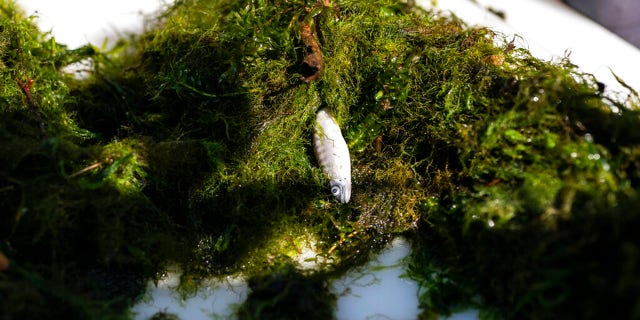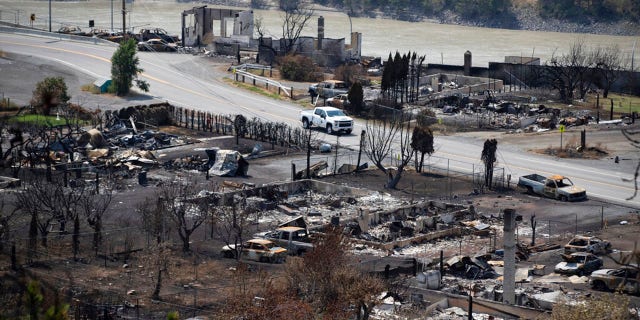Heat wave in Pacific Northwest, Canada killed more than 1 billion sea creatures: researchers

[ad_1]
As extreme climate-related events strengthen in intensity and frequency worldwide, wild animals are often the first to be impacted.
An estimated 3 billion animals were killed in the Australian bushfires from 2019 through early 2020.
In Utah, the millions of birds that made their home at the Great Salt Lake have been affected by the severe and widespread drought plaguing the western U.S.
SWELTERING JUNE BREAKS HEAT RECORDS IN NORTH AMERICA
In California, officials have warned that protected populations of salmon might not make it through the sweltering summer season. Millions of salmon have been relocated by the California Department of Fish and Wildlife using special trucks.
In Florida, hundreds of fish have washed onto Tampa Bay and St. Petersburg beaches, and the Florida Fish and Wildlife Conservation said fish kills were expected to be red tide-related.

A dead chinook salmon is documented at a salmon trap on the lower Klamath River on Tuesday, June 8, 2021, in Weitchpec, Calif. A historic drought and low water levels on the Klamath River are threatening the existence of fish species along the 257-mile-long river. (AP Photo/Nathan Howard)
Red tides – caused by algal blooms – have been lethal in the area before. Other animals, including dolphins, sea turtles and manatees, perished during a similar outbreak in 2018.
Although the reason for the fish kills is under debate and polluted wastewater could be the culprit, NPR reported that the blooms are rarely seen in the summer and in the Tampa Bay area.
Warmer waters, a change in salinity, more carbon dioxide, changes in rainfall and sea level rise combine to provide a hospitable environment for the blooms, according to the Environmental Protection Agency.
And yet, when University of British Columbia professor Christopher Harley announced that more than 1 billion sea creatures were killed along the coast as a heat dome bared down on the Pacific Northwest and Canada earlier this month, it still came as a shock.
“So far, my students and I have recorded dead animals on beaches that span hundreds of kilometers of shoreline,” the marine biologist told E&E News on Thursday. “Eventually, parts of the British Columbia coast may become more like Hong Kong and other hot parts of the world, where many of the intertidal species die off every single summer.”
Harley’s team estimated that 1 million mussels had died in a space the size of a tennis court and 100 million barnacles had perished in a 1-kilometer area.
According to Live Science, the last heat-caused mass killoff of shellfish occurred in California’s Bodega Bay in 2019.
EARTH’S ATMOSPHERE TRAPPING ‘UNPRECEDENTED’ AMOUNT OF HEAT: NASA, NOAA REPORT
Northeast of Vancouver, temperatures reached triple digits during the heat wave, with Lytton, British Columbia, recording a high of more than 121 degrees Fahrenheit, according to the Environment Canada British Columbia Twitter account.
Later, the nearly 1,000 residents of that village fled for their lives as a wildfire tore through their community, destroying most of their homes.
One man said he watched his parents die when a power line fell on them while trying to escape the flames.

A Royal Canadian Mounted Police (RCMP) vehicle drives past the remains of vehicles and structures in Lytton, British Columbia, Friday, July 9, 2021, after a wildfire destroyed most of the village on June 30. (Darryl Dyck/The Canadian Press via AP)
Hundreds in the U.S. were killed by excessive heat and the National Oceanic and Atmospheric Administration (NOAA) later reported that the month of June was the hottest on record in North America.
According to a U.S Drought Monitor update on July 8, almost 78 million people were in a drought area in the contiguous U.S.,, with 57.52% of the region marked as “Abnormally Dry” to “Exceptional Drought.”
That number is up from the nearly 44% of the U.S. mainland in drought at the beginning of June.
Harley warned that losing intertidal animals like mussels could have an adverse effect on the region’s biodiversity, noting that many had reported observations of die-offs up and down the continental coast.
“For most of the strange and wonderful creatures that call the mussel bed home, we don’t even know enough about them to know how many were lost and if and when they will recover,” he lamented.
Fox News has reached out to Harley for further comment but did not immediately receive a response.
In its National Climate Assessment, NOAA wrote that the fact the Earth’s climate is changing is “apparent across the United States in a wide range of observations.”
CLICK HERE FOR THE FOX NEWS APP
“The global warming of the past 50 years is primarily due to human activities, predominantly the burning of fossil fuels,” the agency said, noting “stronger evidence confirms” that an increase in extreme weather and climate events like heat waves are related to human activities.
“Human-induced climate change is projected to continue, and it will accelerate significantly if global emissions of heat-trapping gases continue to increase,” NOAA cautioned.
The Associated Press contributed to this report.
[ad_2]
Source link





